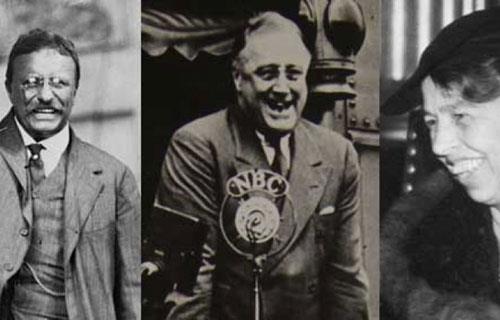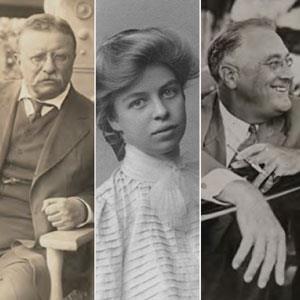
Ken Burns and his team have made some astoundingly instructive and entertaining nonfiction series for PBS. Their new epic, on the Roosevelts, is their best yet…
I say that knowing, full well, what an outrageously sounding claim it is. Since his perceptive and evocative Brooklyn Bridge PBS debut in 1981, Burns has become, and remained, our country’s preeminent documentary filmmaker.
The Civil War, in 1990, was the long-form nonfiction triumph that vaulted him to the top of the history heap – and since then, he’s never been seriously challenged, much less toppled. Baseball in 1994. The War in 2007. Prohibition in 2011. The Dust Bowl in 2012. And those are just the highest of high watermarks, in a career that also included such less expansive but no less rewarding productions as his history of early radio (1991’s Empire of the Air), and his perceptive biographies of, among others, Thomas Jefferson in 1997 and my personal favorite, Mark Twain, in 2001.
 That’s an amazingly long and impressive career, and one that smacks of loyalty as well as quality. Burns tends to find people whose talents he values and respects – writers, narrators, vocal actors, fellow producers and editors – and work with them again and again.
That’s an amazingly long and impressive career, and one that smacks of loyalty as well as quality. Burns tends to find people whose talents he values and respects – writers, narrators, vocal actors, fellow producers and editors – and work with them again and again.
Burns’ approach to his chosen subjects never varies much: There’s always a lot of exhaustive research, both historical and through available photographic archives, combined with original photography shot at surviving locations. Actors are chosen to read the words of historical figures, and the emphasis, invariably, is on bringing history, and those who made it, to vibrant, relatable life. All this while never, ever underestimating the intelligence, curiosity or stamina of his audience, of whom he often asks an almost ridiculous commitment of viewing hours, and good faith, to absorb his latest documentary series.
The latest offering from Ken Burns and his colleagues, for example, is a 14-hour TV program split into two-hour portions, and doled out over seven sequential nights, starting Sunday, Sept. 14, at 8 p.m. ET. It’s called The Roosevelts: An Intimate History, and it’s a joint biography of Theodore Roosevelt, his fifth cousin Franklin Delano Roosevelt, and Teddy’s niece Eleanor Roosevelt.
Taken separately, any of these three historical figures could have justified a full-fledged Ken Burns biography. But by combining their family stories into one naturally and emotionally connected arc, The Roosevelts tells a story that stretches over more than a century, touches on so many themes and moments from previous Burns documentaries – yet emerges, by the end, as a narrative so complex, so revealing and ultimately so inspirational, it deserves to be embraced, and devoured, as the best thing Burns has done to date.
 He has, of course, as always, relied upon and benefited from some ridiculously invaluable help. Geoffrey C. Ward, a biographer of FDR, is the scriptwriter of this entire mammoth enterprise. He’s not the only wonderful writer Burns has worked with over the years, but he’s certainly one of the best: his writing credits for Burns include The Civil War, Baseball, The War, Mark Twain and others.
He has, of course, as always, relied upon and benefited from some ridiculously invaluable help. Geoffrey C. Ward, a biographer of FDR, is the scriptwriter of this entire mammoth enterprise. He’s not the only wonderful writer Burns has worked with over the years, but he’s certainly one of the best: his writing credits for Burns include The Civil War, Baseball, The War, Mark Twain and others.
But here, for The Roosevelts, he’s on camera as well as behind the scenes, and slowly but surely emerges as this documentary series’ Shelby Foote, the historian who made The Civil War connect with millions of viewers because of the raw authenticity and naked passion of his spoken accounts. Ward, for this series, is as much of an MVP on camera as he is as a writer.
And there are other all-stars who, though never appearing on camera, also are key reasons why The Roosevelts: An Intimate History flows so beautifully. Paul Giamatti, as the voice of Theodore Roosevelt, captures both his bluster and his private insecurities. Edward Herrmann, as FDR, perfects, once again, the role he first embodied superbly decades ago in ABC’s Eleanor and Franklin telemovie. And as the voice of Eleanor Roosevelt, Meryl Streep does some amazing vocal work, her voice seeming to age decades, and be laden with increasing emotional weight, as The Roosevelts works its way through the decades.
Sunday’s Part 1 ends as Teddy, at age 42, suddenly inherits the office of President of the United States, ascending as the youngest President in American history to that point. In Part 3, Franklin’s story moves to the foreground, and he ascends to the Presidency at the end of Part 4. By midway trough Part 7, only Eleanor is left – but the family story, thanks to her, still has a way to go. And viewers, without doubt, should go every step of the way.
--
For my full review of The Roosevelts: An Intimate History on Wednesday’s Fresh Air with Terry Gross on NPR, please visit the Fresh Air website.